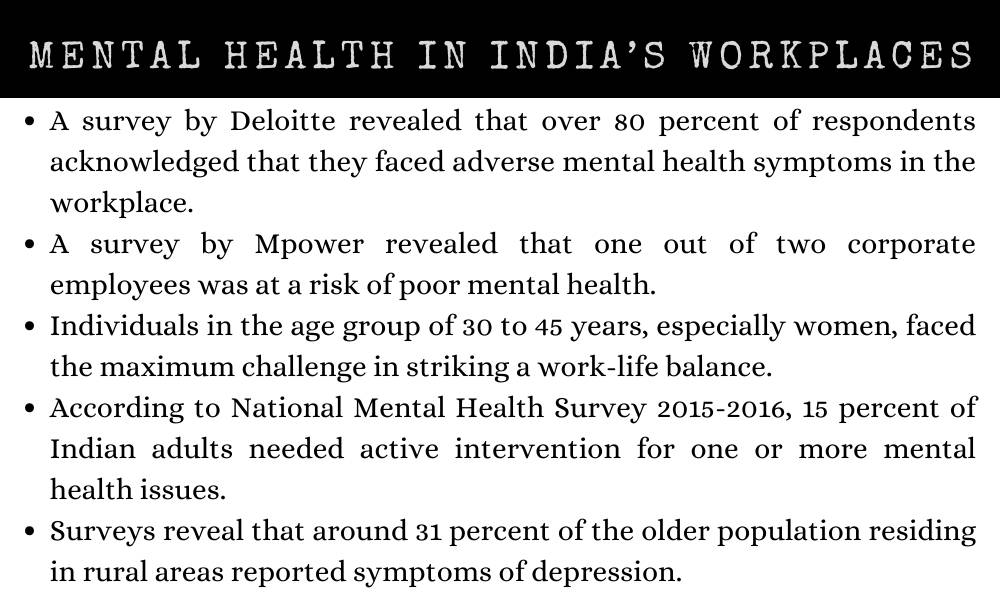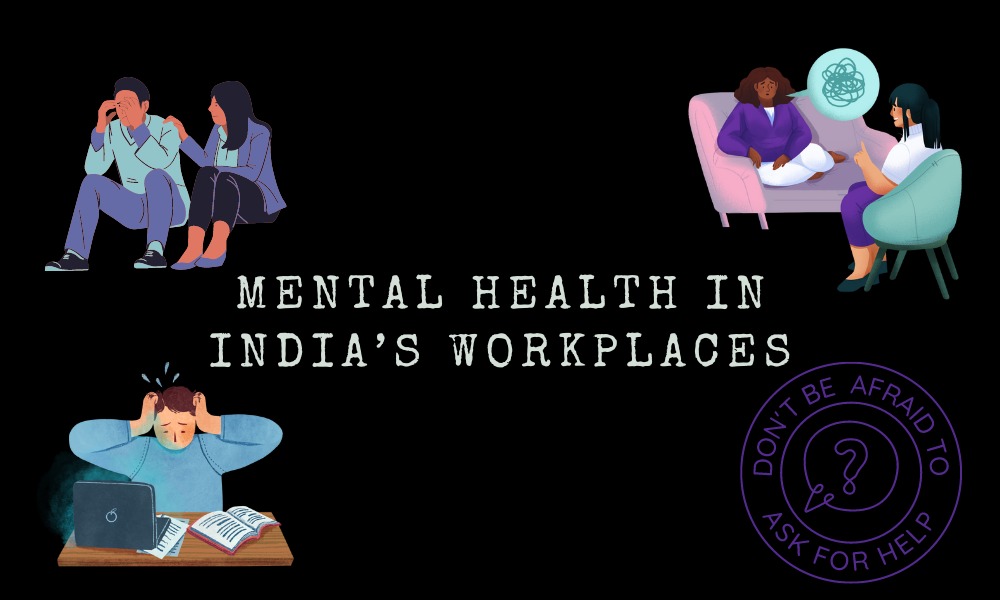Although organised sectors demonstrate some initiatives in promoting the mental well-being of their employees, the unorganised sector often falls short in addressing such concerns.
Anusha was over the moon when she landed her first job with a Kochi-based fashion boutique after graduating from a premiere fashion technology institute. Soon, the excitement wore off. The office was not as welcoming as she imagined it would be. The office politics got to her. And, she could not find any support among her older colleagues. The organisation did not have any mental health support either. Disillusioned, she decided to call it quits.
Anusha’s is not an isolated incident. It echoes the experiences of many others who, like her, have struggled with challenging work environments. It highlights how organizations often ignore the mental well-being of their employees by reducing mental health support to occasional meetings with HR personnel or a counselor—approaches that often prove inadequate in addressing the complex challenges employees face.
In a recent survey conducted by Deloitte, titled ‘Mental Health and Well-being in the Workplace’, it was revealed that over 80 percent of respondents acknowledged that they experienced at least one adverse mental health symptom. The predominant symptom reported was that of depression. Only a few sought professional assistance. Most opted for self-help or sought support from friends and family. They said that the persistent stigma surrounding mental health, and lack of resources and awareness kept them away from professional help.
Similarly, a recent survey by Mpower, an initiative of the Aditya Birla Education Trust, revealed that one out of two corporate employees was at risk of poor mental health. The survey found that individuals in the age group of 30 to 45 years faced the maximum challenge in striking a work-life balance. Females were found to have significant challenges towards striking a work-life balance over males, citing lack of personal and family time as the main factors.
Shubhangi Saxena, who works as an account manager in Uttarakhand, said that she feels that her organization does not prioritize its employees’ mental well-being. “The company lacks welfare programmes to alleviate stress, and no counsellors are available. Previously, whenever I’ve had mental breakdowns due to workload and work pressure, I relied on seeking advice from seniors and confiding in friends,” she said. She added that if organizations dedicate at least an hour each week to destressing activities like yoga or meditation to help combat work pressure, it would be beneficial for the employees.
Sriram, who works as a graduate trainee engineer in a Bangalore-based firm, said that tight deadlines and heightened workloads are the primary sources of his workplace stress, impacting both his productivity and personal relationships. “The organization I work in occasionally conducts games, activities, and outings for us which act as stress busters. However, even when the company offers counselling services, employees hesitate to confide fearing repercussions,” he said.
Many others share similar narratives of struggling with work pressure and toxic environments without having anyone to confide in, given the absence of counsellors or advisers in their organizations.
The survey by Deloitte revealed that the pandemic worsened the mental health struggle of employees in organizations. Many felt that the pandemic blurred the lines between work and home. Working from home meant longer work hours, the isolation associated with the virtual working environment, and concerns related to job security.
Likhita, who works in a Hyderabad-based consultancy firm said, “Since I work in hybrid mode, more often than not, I tend to take my work home. It is like I spend every waking moment working, even during the weekends. This leads to a lot of stress and pressure.” She said that though her organization offers counselling, she did not find it useful for coping. “I usually try to deal with stress in my own ways or rely on my family for support,” she added.
The National Mental Health Survey 2015-2016 showed that 150 million people in India needed intervention for mental disorders, however, less than 30 million were seeking care. The report revealed that nearly 15 percent of Indian adults (those above 18 years) needed active interventions for one or more mental health issues. However, the median duration between the onset of symptoms and seeking care varied, ranging from 2.5 months for depressive disorders to 12 months for epilepsy. The report pointed out that at least half of those with a mental disorder reported disability in all three domains of work, social, and family life.
According to World Health Organization (WHO) data on India, of those over 18 years, 0.9 percent were at high risk and 0.7 percent were at moderate risk of suicide. The highest-risk groups were females compared to males, those living in urban metros, and those between the ages of 40 to 49 years. WHO estimated that the burden of mental health problems in India was 2,443 disability-adjusted life years (DALYs) per 10,000 population. It estimated the country’s economic loss due to mental health conditions, between 2012 to 2030, at $1.03 trillion.

A representative of a consulting firm based in Punjab said that their organization conducts surveys regularly to evaluate the well-being and job satisfaction of their employees. “We also organise activities and events for the employees regularly to relieve their stress and promote team bonding. Often, employees themselves organise trips and parties to relax,” she said.
Sai Krishnan R., recruiting officer of an MNC, said, “Our organization looks out for the mental and physical well-being of our employees by engaging them in recreational activities and organising medical camps for them. On-call counsellors and psychologists are available for the employees who wish to seek professional help for their mental health needs.” He said that his organization has been working towards promoting a good work-life balance among its employees by creating a supportive environment for remote work, especially during and after the pandemic.
However, psychologists point out that it is crucial to recognise that the working population extends beyond the metros, actively participating in activities in rural areas where awareness about mental health is still in its early stages. This disparity highlights that while the organized sector demonstrates comparatively better efforts in safeguarding employees’ mental health, the same cannot be said for the unorganized sectors.
Surveys reveal that around 31 percent of the older population residing in rural areas reported symptoms of depression. Anxiety (10.8 percent) and suicidal ideation (3.5 percent) were the other mental health issues reported among the rural population. These were more common among women and those between the ages of 30 and 59.
The owner of a flour mill said, “Workers in such industries too face challenges arising from excessive physical labor and their personal issues. But they lack awareness about mental well-being. After a day’s work, they return to their families, unwind in their own ways, and repeat the cycle the next day. That’s how it has always been,” he said.
Dimple Panchal, a clinical psychologist, attributed the lack of awareness about mental health, especially among the rural population to the taboos and myths associated with mental health, fear of confiding in others, and lack of awareness about the available resources. “People often ignore symptoms of mental distress, thinking that it will pass. They only seek professional help once they feel that they cannot cope with it by themselves, which at times turns out to be too late,” she said. She added that workplace stress can also lead to psychosomatic disorders such as pains and gastrointestinal issues.
“Managers play an important role in ensuring the well-being of their team members. Regular meetings to discuss the work-related problems and needs of the employees is a step in the right direction,” she said. However, team leaders must avoid micromanaging their teams and keep the professional and personal life of their team members separate, she added. Strong HR policies and the availability of professional help in the organisations are important in ensuring the mental well-being of employees in the workplace. “They must have the confidence that the information they share with their counsellor will not be shared with others,” she added. Having a good social support system is equally important to overcome mental health struggles, she said. “People must realise that help is available,” she added.




